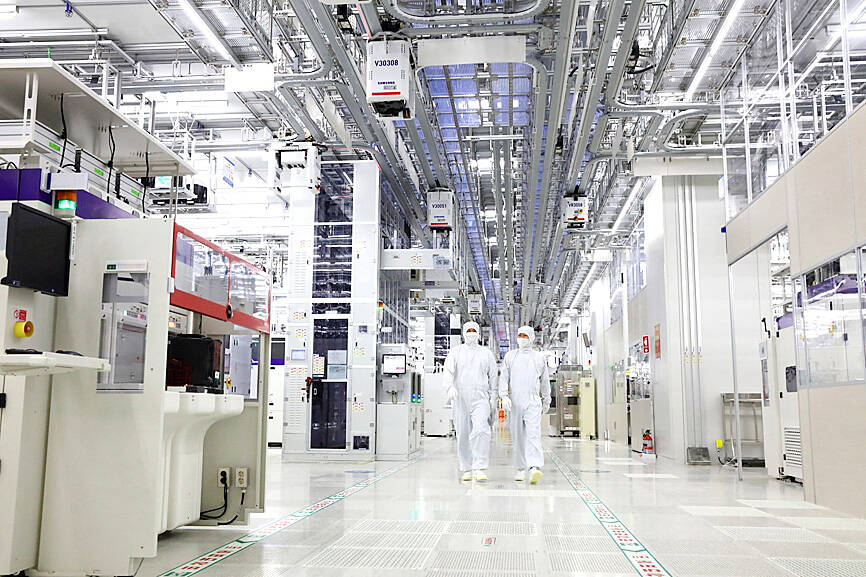South Korea’s exports continued to decline last month in a sign of cooling global demand as higher interest rates weigh on consumption.
Overseas shipments dropped 9.5 percent from a year earlier, compared with economists’ forecasts for an 11.1 percent decline, and imports fell 2.4 percent, data released yesterday by the South Korean Ministry of Trade, Industry and Energy showed.
The trade shortfall was US$4.7 billion last month, resulting in the first annual deficit since the global financial crisis, as elevated oil prices battered many trade-dependent nations.

Photo: Reuters
South Korean exports are a major barometer of global commerce and tech demand as the nation produces key items such as chips, displays and refined oil.
Trade resilience has been a key source of reassurance for the Bank of Korea that the economy could withstand higher borrowing costs even as it tightened policy over the past year.
However, the cycle of interest rate hikes is likely close to ending as the central bank becomes more concerned about growth with the world economy slowing.
South Korean exports last year increased 6.1 percent, while imports rose 18.9 percent. The contraction in monthly shipments began in October, with weaker chip demand leading the decline.
Semiconductor sales plunged 29.1 percent from a year earlier last month, the fifth straight monthly drop, the trade ministry said.
Chipmakers are adjusting to the slackening demand, and cut production in November by the most since 2009.
Elevated inflation, China’s emergence from “zero COVID-19” and Russia’s invasion of Ukraine are among other factors complicating the outlook for trade.
Labor strife is another factor that could hit the economy, as workers express discontent fueled by soaring prices. A nationwide truckers’ strike weighed on South Korea’s supply chains before ending last month.
Exports would likely fall 4.5 percent this year and imports could decline 6.4 percent, the South Korean Ministry of Economy and Finance said.
Rivalry between the US and China over semiconductor hegemony poses a longer-term threat to South Korea whose trade depends heavily on momentum in global memory chip sales.
China’s struggle with nationwide COVID-19 outbreaks has also disrupted South Korea’s overseas shipments. Exports to China fell 27 percent year-on-year last month, while shipments to the US increased 6.7 percent, the trade ministry said.

Vincent Wei led fellow Singaporean farmers around an empty Malaysian plot, laying out plans for a greenhouse and rows of leafy vegetables. What he pitched was not just space for crops, but a lifeline for growers struggling to make ends meet in a city-state with high prices and little vacant land. The future agriculture hub is part of a joint special economic zone launched last year by the two neighbors, expected to cost US$123 million and produce 10,000 tonnes of fresh produce annually. It is attracting Singaporean farmers with promises of cheaper land, labor and energy just over the border.

US actor Matthew McConaughey has filed recordings of his image and voice with US patent authorities to protect them from unauthorized usage by artificial intelligence (AI) platforms, a representative said earlier this week. Several video clips and audio recordings were registered by the commercial arm of the Just Keep Livin’ Foundation, a non-profit created by the Oscar-winning actor and his wife, Camila, according to the US Patent and Trademark Office database. Many artists are increasingly concerned about the uncontrolled use of their image via generative AI since the rollout of ChatGPT and other AI-powered tools. Several US states have adopted

A proposed billionaires’ tax in California has ignited a political uproar in Silicon Valley, with tech titans threatening to leave the state while California Governor Gavin Newsom of the Democratic Party maneuvers to defeat a levy that he fears would lead to an exodus of wealth. A technology mecca, California has more billionaires than any other US state — a few hundred, by some estimates. About half its personal income tax revenue, a financial backbone in the nearly US$350 billion budget, comes from the top 1 percent of earners. A large healthcare union is attempting to place a proposal before

KEEPING UP: The acquisition of a cleanroom in Taiwan would enable Micron to increase production in a market where demand continues to outpace supply, a Micron official said Micron Technology Inc has signed a letter of intent to buy a fabrication site in Taiwan from Powerchip Semiconductor Manufacturing Corp (力積電) for US$1.8 billion to expand its production of memory chips. Micron would take control of the P5 site in Miaoli County’s Tongluo Township (銅鑼) and plans to ramp up DRAM production in phases after the transaction closes in the second quarter, the company said in a statement on Saturday. The acquisition includes an existing 12 inch fab cleanroom of 27,871m2 and would further position Micron to address growing global demand for memory solutions, the company said. Micron expects the transaction to